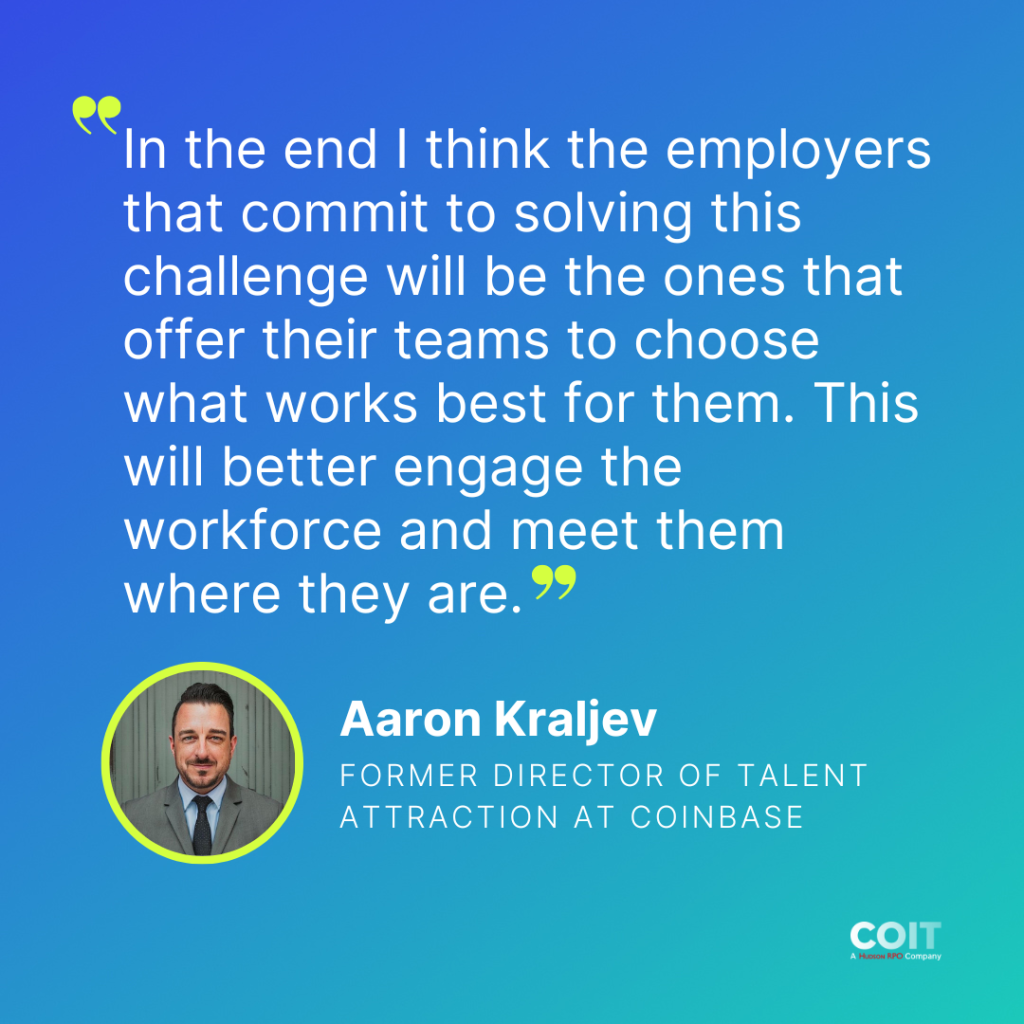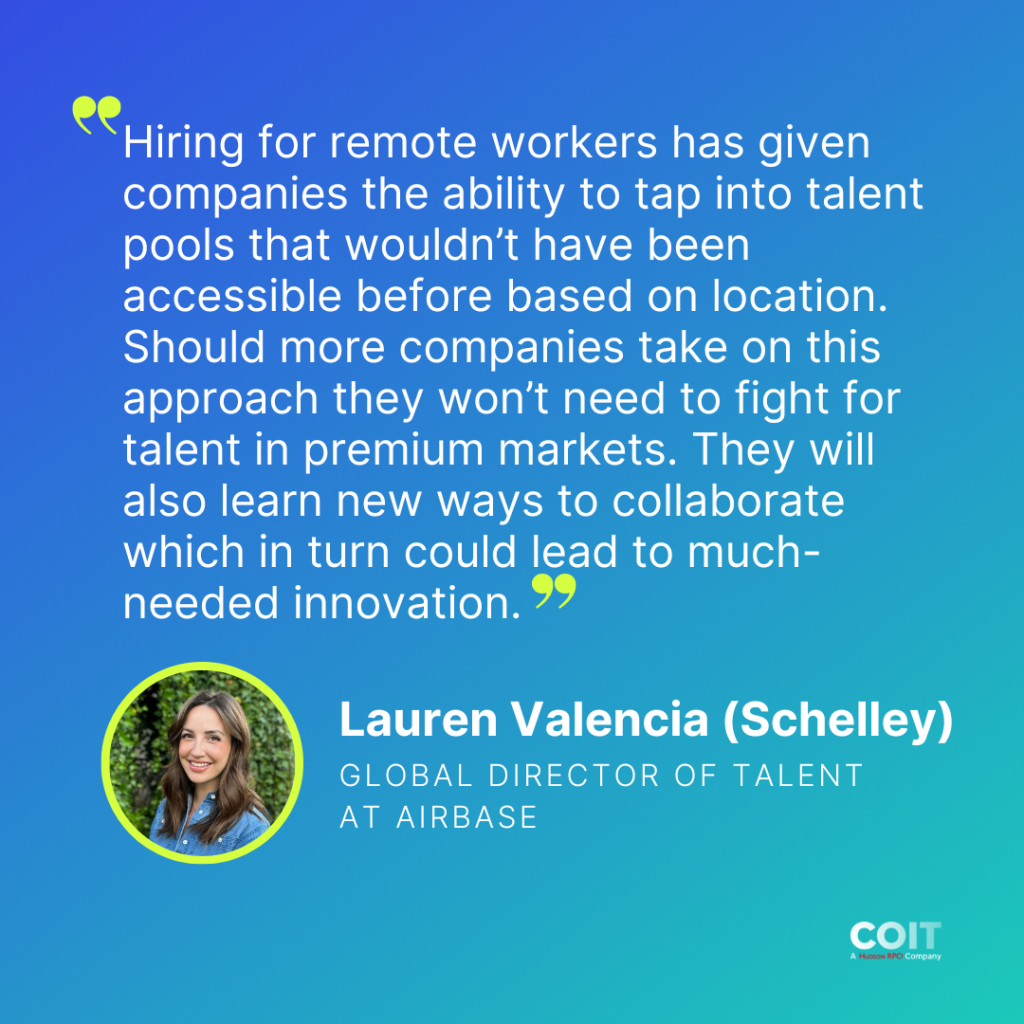Remote work is a hot topic once again, especially as global companies try to shift back towards in-person work while remote and hybrid work models remain popular among employees. As organizations navigate the challenges and opportunities presented by this evolving landscape, it is crucial to examine the insights and perspectives of talent acquisition leaders who have witnessed and contributed to this transformation.
While the past few years have seen numerous companies experimenting with remote work, pivoting to remote arrangements is not enough. Employers need to create intentional moments of connection and trust in remote work environments.
However, remote work is not without its challenges, a sentiment shared by many of our contributors. Balancing the benefits of remote work with in-person collaboration is a recurring theme.
As the future unfolds, it is clear that remote work will remain a sought-after benefit. Here are what the TA leaders we partnered with had to say:
KJ Jenison, Director of Talent Management at Shippo
Over the past few years, we’ve seen countless companies make more remote work pivots than the cast of Friends moving a couch up a flight of stairs. Over-indexing on driving results yet under-valuing what can enable success through an effective remote work environment. What will that look like in the next few years?
Creating intentional moments of connection through onsite gatherings a few times a year as well as trusting your people by giving them autonomy to produce the best results wherever they are with their laptop.”

Josh Hudson, Head of Talent at Apera AI
Remote work is now less than 40% of jobs posted in the US, and we can see in the tech recruiting field many but not all job types are being asked or made to come back to at least hybrid if not 100% in-office.

Aaron Kraljev, Director of Talent Attraction at Coinbase
While we are seeing a bit of a resurgence of onsite work as we come out of the pandemic I do not see the future of how this is managed as onsite versus offsite. I have seen top talent struggle with the solitude of working remote just as much as I have seen others fully embrace the flexibility that offsite work can offer.
In the end, I think the employers that commit to solving this challenge will be the ones that offer their teams to choose what works best for them. This will better engage the workforce and meet them where they are, so to speak. A healthy mix of onsite collaboration for those that thrive on that with the flexibility of remote work for those that prefer it. Nailing this will prove to be a competitive advantage for those who want to engage and convert the very best talent.

Lauren Valencia (Schelley), Global Director of Talent at Airbase
Given most of the candidates that we talk to favor the flexibility of remote work, I believe it will continue to plant its feet as a top 3-5 perk, trailing not too far behind benefits and compensation. Companies will need to prepare to offer better tools for collaboration, a better employee experience, and learning & development opportunities centered around being successful in this environment while fostering connections.
Hiring for remote workers has given companies the ability to tap into talent pools that wouldn’t have been accessible before based on location. Should more companies take on this approach they won’t need to fight for talent in premium markets. They will also learn new ways to collaborate which in turn could lead to much-needed innovation.

Lewis Adams-Dunstan, Director at Martin & Conley
Semi-Hybrid work models, striking a balance between remote work and in-person collaboration once a quarter, are the future. While remote work offers increased productivity and work-life balance, in-person interactions foster creativity, idea-sharing, and strong bonds. The magic happens when we connect on a human level. Companies embracing this hybrid approach understand the importance of personal growth, professional development, mentorship, knowledge-sharing, and social skills. They recognize that team-building activities and in-person brainstorming sessions enhance collaboration. By finding the right balance, companies show that they value both freedom and flexibility, as well as the energy and inspiration that come from being together periodically. This hybrid approach offers the best of both worlds, leveraging the benefits of remote work while fostering human connection.

Harmeet Singh Gill, HR Consultant
The future of work is undergoing a transformative shift, driven by the widespread adoption of remote work. Forward-thinking organizations that embrace hybrid work models and leverage cutting-edge virtual tools will cultivate highly productive and collaborative environments. This shift towards remote work will not only attract a diverse pool of global talent but also foster inclusivity and break down geographical barriers. By reducing talent concentration in specific areas, it will ignite economic growth and create opportunities for untapped regions. Effective leadership is essential as executives reimagine talent strategies to accommodate individual preferences for remote or in-office work, unlocking the full potential of professionals in an ever-evolving work landscape.

Carrie Stiles, MBA, CLSP, CRP
If current indicators remain, offsite staff will dominate the future of work. Older workers still desire the community and humanity of onsite, but they are retiring out. Younger workers are used to more virtual connections and this makes in-person connections less important. Most workers are now spoiled with no longer having to “get ready” in the morning and sit in rush hour traffic. In large cities, this entire process can take 3 to 5 hours a day. Think about that time in monthly terms and the savings in time alone is huge. For these and other reasons, offsite will remain the preferred work type and employers will struggle filling roles that do not offer a remote opportunity.

Tim Farrelly, Co-Chief Executive Officer at Coit Group
Remote work will continue to evolve, shaping the way organizations operate and attract talent. Creating intentional moments of connection and fostering trust in our remote employees’ ability to produce outstanding results are key.
I believe it will remain a sought-after benefit, requiring companies to adapt and provide better collaboration tools, enhance the employee experience, and prioritize learning and development opportunities. Even though some large employers are bringing people back into the office, those that commit to solving the challenges of remote work will differentiate themselves by allowing their teams to choose what works best for them, fostering inclusivity and embracing the transformative shift in work dynamics.

Share these quotes on social!








Be Intentional
As organizations navigate the future of work, the key lies in striking the right balance. By embracing a semi-hybrid approach, companies can leverage the benefits of remote work while fostering in-person interactions that fuel creativity, idea-sharing, and strong bonds. Effective leadership, coupled with enhanced collaboration tools and a focus on the employee experience, will be instrumental in navigating this evolving landscape.
The future of remote work is transformative, and organizations that prioritize the needs of their workforce will be well-positioned to thrive. If you’re unsure how remote work is impacting your recruiting efforts, work with us. We’ll guide you in developing the employer brand and strategy that can get the right people, and culture, in the door. Contact us at https://coitgroup.com/contact/
Newsletter
Blog Categories
Recent Posts

[Tech x Talent Dashboard] It’s time to change DEI metrics and tactics

3 Quick Tips to Improve Your Hiring Process

Beyond the Checkbox: DEI in 2024 and Beyond

The Unexpected Secret to Effective Rapid Response Hiring




